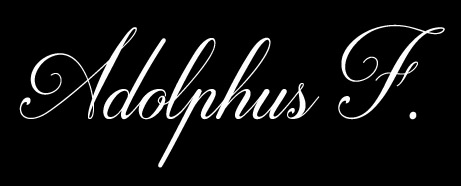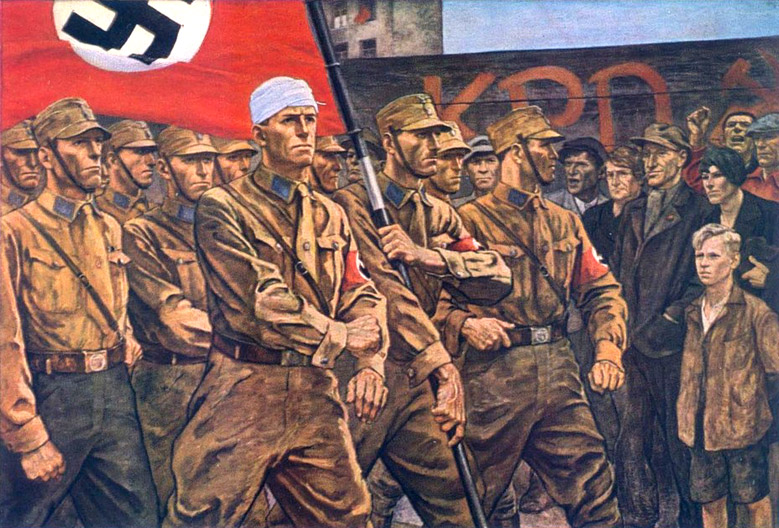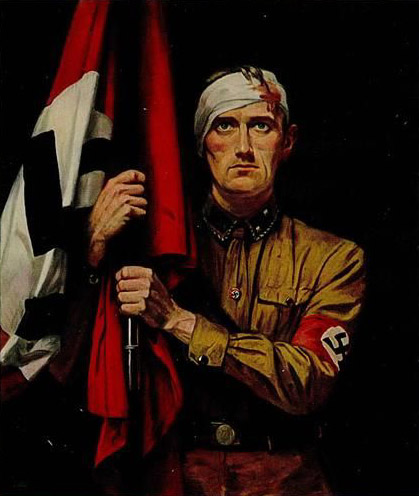
This 1990 interview (done in Hamburg) is with Adolphus F., an early SA (Sturmabteilung) man and later with the Waffen-SS LAH (Leibstandarte-SS Adolf Hitler).


This 1990 interview (done in Hamburg) is with Adolphus F., an early SA (Sturmabteilung) man and later with the Waffen-SS LAH (Leibstandarte-SS Adolf Hitler).

What attracted you to join the SA and fight for Hitler?
Adolphus: First, my fight was for Germany, not Hitler. He was our leader and encouraged us to do everything for Germany, not him. I grew up in a middle class working family here in Hamburg, my father worked at the docks, and I followed him. He was a follower of the Red Front, as they seemed to be the best option to help the workers. We sang the “international” often, but something seemed to be missing. It was announced a NSDAP rally and speech would be held close by, I was curious about they had to say. I had heard bad things about them, but had to see for myself.
At first, the men guarding the venue looked at me with reservation as I had marched with the red front before and maybe they recognized me. I was left alone and heard the speaker talk about the plight of the worker, how the Marxist only use the people as fodder, how love of the people and nation is the mark of a great movement, and a strong faith in God. I had been troubled that the red front was very anti-religious. Our leader was a Jewish man, who kept to his faith, which I thought odd, while he demanded we reject ours, and actually turn on it.
I went home and spoke to my father; he was not unreasonable. He agreed that these were very fine points, and we discussed what we liked and did not like about the red front. We agreed that when the NSDAP spoke again we would both go. This was in 1929. We went again a few months later, at this time a new person spoke, it was Hitler himself. The crowd was huge, with red front protestors throwing bottles and rocks at those entering, we recognized some, and had to tell them we were going in to disrupt things undercover so they did not attack us. Hitler said everything we wanted to hear in a leader, he was honest, brave, and I felt he really cared about our nation and people.
It was at this point I decided to change and join the SA, I spoke to a man after the speech and he told me where to meet to be introduced, and to make sure this was for me. My father also was impressed with Hitler, but did not want to join, as he was too old to march. I was a little disappointed I was told I had to buy my own uniform, even though the party did offer huge discounts and subsidies. I was excited for the first march and rally.
What did you think about the red front once you joined the SA?
Adolphus: I never saw them as my enemies; they were misguided, and gave their loyalty to a foreign idea, but they were my fellow citizens. That was what always bothered me about them, even from the beginning, nothing was for Germany, and it was always about Moscow and world conquest. I did have to keep a low profile, as some were very violent. They would find out where SA men lived and attack their homes and family, or getting them fired for their beliefs.
We tried to stay in touch with red front friends, and explain why we switched, but they became filled with hate, and wanted nothing to do with us. Work on the docks was hard, as they discriminated against us. I became more against them, as they saw them in action, they preached freedom, tolerance, and open minds, but they were hypocrites. By the time we won the election, I hated them, as all I saw was a criminal element masquerading as a political party who used hate and terror to make their point.
Where you in street fights with them often?
Adolphus: No, the media overinflates this, most of the time things were peaceful, just a lot of shouting and throwing things. I was able to move out of my parents flat, and into my own apartment thanks to the SA, rent was very cheap due to finding a party comrade who was a proprietor. It felt good to be on my own at 19.
I will tell about one strange incident, and how I met my first girlfriend. In 1929, things were bad in Germany and the economy was in shambles. My SA sturm was marching to protest a vote that would outlaw our symbol and marching. We numbered about 75 men and marched down to the mayor’s office. Along the way, the reds threw rocks at us, and tried to disrupt us. The police, even though most supported us, were under orders to stand down and not interfere by their stooge of a chief.
As we stood at attention while our leader spoke, I noticed a very dirty looking girl come up and try to rip off my armband. I could tell she was very pretty underneath her raggedy clothes, and I noticed her dirty top was missing buttons, enough to show her perfectly shaped breasts with big red nipples, I was immediately interested. She was yelling at me, asking why I was marching with people who were opposed to a better world, and against human rights. I broke my bearing and told her I was doing this for my nation, people, and her, so she would have a better life.
She told me she was homeless, and still felt compelled to fight for human rights, as it was the right thing to do. I replied that the right thing to do is for me to show her compassion and offer her a meal and a place to clean up. This stopped her mid-sentence, and she gave me a surprised look, and then asked if I was serious. I said yes, and that she should follow me back. My Sturmführer, yelled at me to stop talking, I winked at her, and was hoping she would follow. Which to my surprise, she did.
I ended up bringing her back with me, and offered her a meal and my shower. She had an incredible figure, and was not afraid to show it off to me, love and lust took its course. I had earned extra money so I took her out the next day to buy her a new outfit. She agreed to work with a comrade’s wife in a dress shop, and the more she saw our side, the more willing she was to have an open mind. I was always afraid she would run back to the red front, even though she told me they always harassed her, marginalized her since she had been homeless, and tried to pimp her out witch she refused.
The “battles” we fought were not anything special. They were more like protests, and handing out propaganda, sometimes right next to red front members. Very few times did we come to blows.
Did you ever see, or hear about political killings and assassinations?
Adolphus: Yes, I never saw any, but it was well known in other cities that the fighting was brutal, and sometimes fatal. A book about our martyrs was in every party office, and if I remember, there were several hundred killed by communists, including mere children. Close by our city a comrade had his home fire bombed, killing his wife and sons. I met several comrades after the kampfzeit [time of struggle-ed.] who told about having Molotov cocktails thrown at them, knife attacks, broken bottles hurled, and feces thrown at them. Their military bearing prevented them from breaking ranks, most of the time.
Did you ever meet Hitler?
Adolphus: Yes, I saw him a few times, during meetings, parades, and a Nurnberg rally. I was always impressed that even though the Reds always spoke about killing him, he always strode about in the open and so confident, ready to take on any challenge. He shook my hand once when I attended a meeting where he was the lead speaker.
He thanked us for our hard work and faithfulness. He clapped me on the shoulder and asked if my time in the SA had been good so far. Even though the SA had infighting, petty bickering, and a purge of dis-loyal leaders, I am glad I served in the awakening of my nation and people.
What brought you to the Waffen-SS?
Adolphus: After the election, I settled into a very good job as a shipping clerk, and the economy started booming again by 1935. I dropped out of the SA, but remained a party member. By 1939, I was a manager and had gotten married in 1937 to a very pretty woman who worked at the local party office. The girlfriend ended up not working out, as she was very independent and wanted to travel often where my job would not allow that type of existence, so we parted ways. She went on to become a model in the fashion industry. She was a good example of how the NSDAP changed someone for the better. However, I ended up with a much better woman, who only wanted to be a good wife and mother.
In September 1939, when the war started, I was exempted from military service due to age and occupation. Almost immediately we started seeing air raids hitting our city, first leaflets then in May 1940 bombs. We were lucky in 1943 to be on vacation when Hamburg was firebombed, killing thousands. Our home and everything was gone, my parents killed. By late 1943 the war was clearly not going well, the papers spoke of set back after set back, and more classes were being called up in the draft. I knew my time would come, and I wanted to get at the enemy.
I spoke to my wife and told her if I am drafted, I have no say where I go, so I decided to enlist in the SS, as it was elite, and a branch of the party. I thought I would get favorable choice of stations. I went down to the recruiting office and was accepted and placed in the LAH, but to my dissatisfaction, I was put in the infantry where I thought I would be better at recruiting or office work. Off to the infantry I went, and by mid-1944, I was fully ready for action and reported to the second panzer grenadier battalion of the LAH in Belgium.
We trained for the coming allied invasion, and I was close to home, with great food and weather. I was happy. The civilians treated us very well, and we helped them around their farms or homes if they needed it. My wife was close by as we moved her to Aachen, and she again worked for the party. Therefore, I saw her every weekend.
Where you sent to Normandy?
Adolphus: Yes, we were placed on heighted alert in late May, and moved closer to the coast. On June 6, it was announced the invasion had begun and for the first time I had fear. We had seen allied planes in the sky, with no one to challenge them, comrades told us they had total control of the sky, and strafed anything that moved, even civilians. Therefore, everyone was careful and alert.
Our flak was doubled as we prepared to march. It took what seemed like eternity to get to where we needed to go. The Allies landed agents, who worked with the resistance sabotaging rail lines, felling trees into roads, and breaching dykes to flood the roads. We had to get out and clear areas often. We once captured a group of bandits at night, who snuck into our area with the intent of planting explosives, but sentries caught them and I saw Brigadeführer Wisch come out to speak to them. Our commander ordered they be held as combatants, which was strange as they were in civilian clothes.
The LAH did not make it to Normandy until mid-June, by then it was a lost battle as the Allies moved several km inland. Many in my unit were angry that it took so long to be placed at the front; we believed that if we could have been one of the first to hit the enemy we could have thrown them back. Now, under constant air, artillery, and tank attacks we reeled but held our resolve to fight. My training had been tough, with much focus on survival in combat. It paid off.
The Brits and Canadians hit us often, but we would throw them back, and then counterattack, only to be driven back by superior firepower and numbers. The allied advantaged was truly astonishing. Even the prisoners joked about being released soon, due to the pending victory. They knew we were being crushed under their overwhelming might. But we fought on as we knew we were right.
We cheered when a nearby flak unit hit a P47 and blew the engine off it. The pilot had no time to bail out as he went so close in to strafe. I was amazed at the vast amount of tanks the Allies lost, we had to have had a 20 to 1 kill ratio, yet they just could not be stopped. The Allies even had the luxury of using heavy bombers to carpet us every so often. I was wounded in one of these bombing raids, and was being sent to a faraway dressing station when a squad of Brits who surprised us, stopped our truck and took us prisoners. I am surprised they did not shoot us, knowing what I know today.
So my time in the LAH, and Normandy was short lived, this was in July of 44. At first, I was not treated well, and even had the cold metal of a Sten gun pressed into my mouth while my pockets were rummaged for anything of value, and my wedding ring stolen. I was kicked in the head while on my stretcher and my wound was ignored. I was very upset, as I had been told the Allies were humane. After several days of being left in the open, sometimes under our own artillery fire, I was moved to England.
The treatment became better, and I even met some sympathetic people who went to great lengths to care for us. I was impressed, and even happier to have survived. My wife was able to escape Aachen before the battle, and stay with her cousin. The Brits finally released me in 1948 and I was allowed to go back to Germany, and my wife.
